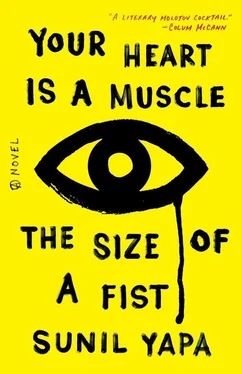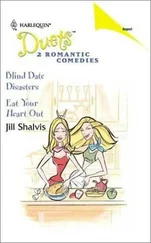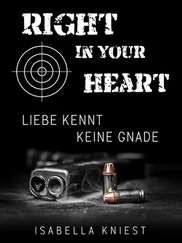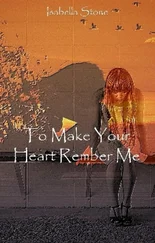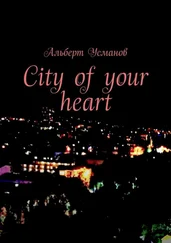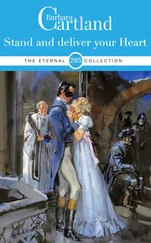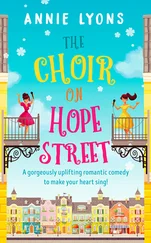It was not always her, people gathered around him, too. The confidence of his quiet manner which drew them in. The way he listened and didn’t jabber on. He had the air of someone you could talk to. Air your doubts in a private setting. Ask him what he really thought. This was a man whose opinion was not influenced by the mob, a man familiar, it seemed, with the darker corners of the human soul, a man capable of both fairness and forgiveness.
But fuck, right now, he wanted to be somewhere nobody knew his name; somewhere nobody looked to him for answers, somewhere nobody expected him to know what to do. He wanted to be in a place that smelled of diesel exhaust, sweetly rotting fruit, meat cooking on a grill.
He wanted to walk streets whose names he didn’t know and couldn’t pronounce. Wanted to be somewhere nobody knew his preferred brand of breakfast cereal and boxer short. Not an American male, aged fifty-nine, widower to a wife of long patient looks, father to a disappeared son, police chief of a medium-sized American city tasked with corralling fifty thousand citizens in the street. The Chief. No, he didn’t want it. Just an American. That’s what he wanted. To be in a place where he was just an American — even if he was hated, or an invading force, or an expatriate, or a coward, he didn’t care.
You get a call on domestic violence and you arrive to find the man beat his girl until she couldn’t see. You ride along with the ambo to the trauma unit and the woman who can barely see, you ask does she want to press charges and she says, “You don’t know. None of you know the way that man loves me.”
Bishop didn’t want to know. Sometimes the world was too much. Too much blood and too much violence and too much gone-out-of-your-head-crazy to include in the human experience. You had to let it slip from your consideration of human life on the planet Earth. Didn’t count. Except it did. No way to reckon it except the world was dark. The world wasn’t hard. It was awful. The Cold War was over and the Darkness had begun. The one where some people were scared to ever fall, the so-called middle class; and the others, fallen already, were squeezed beyond measure. And policing? Well the days of community policing were over. The world was a bottleful of sparkling darkness and cops the ones charged with keeping the cork in while the rich shook and shook.
But what were you going to do? Resign? Quit? Bishop was the Chief of Police, not the President. No, you made your notes and you shook your head and you did your best while the coldness slipped in, while the vise jaws squeezed shut. Tutted your tongue and when your shift was done you had a few beers and a shot and one of the other cops said something low, something funny and sad and twisted that let you laugh away the craziness of what you had to do and see. He laughed. They all laughed. Because the closing of the eyes was not something he wanted and the remaining human was.
Bishop descending the steps to meet the PeaceKeeper where it now sat rumbling halfway up the Sheraton plaza. Bishop’s radio erupting in chatter as he climbed onto the running board.
Bishop Bishop Bishop.
Tom-four-two.
Bishop Bishop Bishop.
Horses. The horses—
Down below black-clad demonstrators dragged a dumpster into the street and, after some arguing and effort, pushed it up and over onto its side. They soaked it with gasoline and lit it.
Someone tossed a Coke bottle filled with gasoline and the dumpster erupted.
They were burning paper and sticks and garbage. The signs that earlier in the day had carried another people’s hopes for a better world. They broke the signs over their bent knees. They threw the pieces into the fire, whooping with a crazed delirium.
Blue flames licked at the wood. Charred and damp soot rose into the air and the way the flames seemed to eat the paper and the way the kids danced around the flames, jeering and celebrating, he just wanted to climb that thick rope of smoke up and on out of here.
A boy standing on top of the dumpster with his fist held righteous in the air.
A group of five flannel-clad demonstrators kicking trash cans into the street. The contents of a briefcase went flying into the flames.
Bishop’s tanned face and the high color on his cheeks. His blue eyes gone small in his head. This was the face of a man trying to summit a peak about to grab his chest and pitch forward into the ice, never to move again, that’s how much he disbelieved what was before his eyes.
An object whizzing for his head. Bishop ducked and a bottle bounced and rolled down the hood of the PeaceKeeper, unbroken. Disbelief like high-altitude death rattling in his chest because how and when had he ever believed this city was his?
He watched the kid silently raise a fist and felt a blinding sense of bafflement and defeat. Who knew what circulated in his mind, this boy, who perhaps imagined himself in a stadium in Mexico City, the winner of a gold medal in the 1968 Olympics, standing not on a dumpster but on the highest podium, his best friend beside him wearing the ribbon and the bronze, tens of thousands of spectators watching them — and he was not white but black, Tommie Smith with John Carlos, barefoot on the podium, the gold medal around his neck as “The Star-Spangled Banner” played to the assembled crowd; his hand a fist of solidarity and strength raised to the indifferent world, a black glove raised straight from the shoulder.
“Look at that fucking kid,” the cop next to him on the running board of the ’Keeper said. The officer that earlier in the day he had busted from his horse. Officer Park. He was here on the PeaceKeeper beside Bishop, and how the hell did he end up here, who knew, that was exactly the kind of day it was. The peaceful protesters long gone and the citizens run amok, rioting and rampaging and he had once nearly broken his son’s arm, done everything but force march him to the door and kick him out in the world. Burned his mother’s books in front of the boy. Jesus god almighty, how could he have ever explained it wasn’t the books which inspired the rage, it was loss. Nothing but loss and confusion and fear.
And it wasn’t that Bishop had only scheduled nine hundred officers. No, his mistake, today, he thought was very simple. He had been too kind. He had allowed himself to trust these people. Kids spitting in the streets. These weren’t peaceful protesters. These weren’t decent people. These were punks and trash. He had mistakenly respected the truth of their position, treated them with a mercy they did not deserve. He had failed to see the true nature of the situation. All-out war in the streets of the city he was sworn to protect. War. And he was losing.
“Hey,” he said blandly to Park, “take that kid out.”
Park turned and raised his shotgun. Turned to his left and raised the gun and found the kid atop the dumpster in one fluid motion. Park shot in a direct line. The kid was across the intersection, a good sixty feet out, and yet the rubber bullet flew straight and true and took the kid in the stomach and dropped him in the street like he’d taken a punch to the gut. He went down like a bag of fertilizer, tumbling into the street, loose-limbed with the dumbest fucking look of surprise.
The daily meanness. The absolute petty nature of the day-to-day. It was like everyone’s eyes had gone hard. Not his fellow cops. The people. Women and men, mothers and fathers and brothers and sisters. They weren’t criminals. They were people with no light left anywhere on their person.
He didn’t know what was worse, really, taking down a couple of rioting citizens or having to roll out to the suburbs and smile into plastic faces whose eyes had gone gray as ash. People out there talked, oh yes, they hung bright colors on their words of this and that, pretty bold ribbons of kindness and concern, but he looked in their eyes, poor folks and rich alike, especially rich, and it wasn’t nothing coming out but the dead hot light of I don’t give a crap, just keep it out of my yard.
Читать дальше
